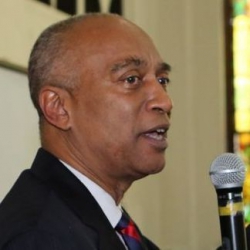
Gary Pretlow said the Assembly is looking to legalize sports betting in case PASPA is overturned, but it’s complicated.
The New York State Legislature is considering a bill which would allow horse racetracks, off-track betting facilities, and non-tribal casinos to house sportsbooks, if the federal ban on sports betting is overturned. A current case before the U.S. Supreme Court has the chance of overturning that ban.
Assemblyman Gary Pretlow, a Democrat from Mount Vernon and the chairman of the General Assembly’s Racing and Wagering Committee, told the Times Union this week that lawmakers are searching for ways to authorize racetrack and casino sports gambling. They want to expedite the issue, if the PASPA sports betting law is repealed. No easy way to make those changes have been found yet.
Opening sportsbooks in tribal casinos would be more difficult, due to sovereignty issues. To operate a sportsbook within the existing legislative framework, a Native American tribe would have to abrogate a certain level of sovereignty. Thus, each tribe would have to renegotiate its gaming compact with the state it is inside.
US States Pass Sports Betting Laws
If New York changed its sports betting laws in anticipation of the PAPSA repeal, it would follow the lead of Mississippi, Connecticut, and Pennsylvania. All have changed their laws, in case the Supreme Court overturned PASPA.
On December 4, lawyers for the State of New Jersey and the major US sports associations will argue the merits of legal sports betting before the 9 justices of the US Supreme Court. A decision is expected from the high court sometime in the first half of 2018. Outgoing New Jersey governor Chris Christie said, if the Supreme Court sided with New Jersey, that Monmouth Park racetrack and Atlantic City casinos would open sportsbooks by the summer of 2018 — in time for next year’s NFL regular season.
NFL Lawsuit v. New Jersey
The hearing before the Supreme Court stems from a lawsuit filed by the NFL, NBA, MLB, NHL, and NCAA in October 2014. The suit was filed to keep Monmouth Park and William Hill USA from partnering on a sportsbook, which the New Jersey attorney general had been ordered to allow to operate.
Over the past three years, that lawsuit has wound its way through the federal civil court system. New Jersey has lost every decision to this point, including an “en banc” ruling by a panel of appellate judges in Philadelphia in August 2016. Many thought that appeals court decision was the end of New Jersey’s 5-year attempt to legalize sports betting, but the US Supreme Court agreed earlier this year to hear the case.
Professional and Amateur Sports Protection Act 1992
One reason many believe the Professional and Amateur Sports Protection Act (PASPA) of 1992 will be overturned in an amicus brief signed by 20 US states, which supports repeal of PASPA. The attorney general of West Virginia wrote the amicus brief, yet states from a wide political spectrum signed on to the brief, believing their state’s rights were being impinged by the PASPA federal ban on sports betting.
At the time PAPSA was passed by the US Congress in 1992, the US sports leagues said that sports betting undermined the integrity of their sports. That might have been a plausible case in an earlier generation, but much has changed since 1992. The carve-out for Nevada and three other states undermined PASPA from the start.
Originally, the sports leagues wanted a 50-state ban. Nevada already had sportsbook betting, though, while three other states — Montana, Oregon, and Delaware — had more limited sports lotteries. All four fought PASPA hard enough that federal lawmakers grandfathered those forms of gambling into the bill. The other 46 states were given one year to pass their own sports gambling legalization acts, but none did.
Changing American Attitudes
In the 25 years since, New Jersey casinos went from being one of two brick-and-mortar gambling destinations in America, to being one of 40 states with land-based or riverboat casino gambling. The multi-state lottery associations grew to 45-state networks of gambling, while over 250 tribal casinos dot the American landscape.
Online gambling sites were launched, while mobile sportsbooks allow Americans to bet on sports on their Android smartphones and iPhones. The argument that legal sportsbooks in New Jersey somehow undermine Americans’ faith in the outcome of sporting events seems somewhat outmoded. In a United States where gambling proliferation has been rapid and multifaceted over the past 25 years, the sports leagues’ arguments no longer hold weight.
Sports Betting Legal Battle
On the other hand, legal precedent is the bedrock of the American legal system. New Jersey has lost 5 different decisions involving PASPA. Each time, experts say they have a chance, to one degree or the other. Each time, New Jersey loses. It is by no means a certainty that the US Supreme Court will overturn PAPSA.
